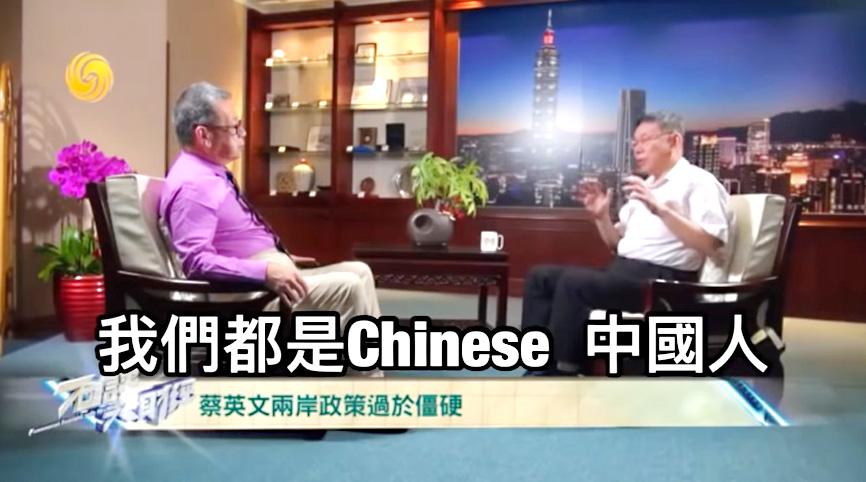The government yesterday designated Phoenix Television a Chinese-funded company, a move that should force the network to close its office in Taiwan.
The government has imposed tighter restrictions on Chinese companies seeking to invest in Taiwan as political and military tensions between Taipei and Beijing increase.
Beijing has ramped up pressure since President Tsai Ing-wen (蔡英文) came to power in 2016, as she rejects its “one China” principle.

.Photo: screen grab from Phoenix Television
The Mainland Affairs Council said that “stock transfers and personnel changes” had turned Phoenix TV into a de facto Chinese state-controlled entity.
Authorities have demanded that the company either stop operating in Taiwan, pull its investment or “rectify” the situation, the council said in a statement.
Phoenix TV’s offices in Taipei and Hong Kong did not respond to requests for comment.
Headquartered in Hong Kong, Phoenix TV is partially state-owned, and offers Mandarin and Cantonese-language programming, including news reports that hews to Beijing’s government.
Its audience is mostly Chinese speakers in Hong Kong, Macau and Taiwan, as well as the overseas ethnic Chinese diaspora.
Filings with the Hong Kong stock exchange show that its largest shareholder is Bauhinia Culture Holdings Ltd (紫荊文化集團), a Chinese government-owned company.
The Chinese-language Liberty Times (the sister paper of the Taipei Times) yesterday reported that Phoenix TV was planning to close its office in Taipei next month and lay off all 25 Taiwanese employees after a six-month negotiation with regulators made no headway.
Under Taiwanese regulations, a company is considered a Chinese investment if a Chinese entity owns more than 30 percent of its shares or has “effective control” over its operations.
Online marketplace Taobao Taiwan, registered as a foreign firm through its operator — a UK venture investment company — was forced to close in 2020 after the government ruled that it was controlled by Chinese e-commerce giant Alibaba Group Holding Ltd (阿里巴巴).

The Central Election Commission has amended election and recall regulations to require elected office candidates to provide proof that they have no Chinese citizenship, a Cabinet report said. The commission on Oct. 29 last year revised the Measures for the Permission of Family-based Residence, Long-term Residence and Settlement of People from the Mainland Area in the Taiwan Area (大陸地區人民在台灣地區依親居留長期居留或定居許可辦法), the Executive Yuan said in a report it submitted to the legislature for review. The revision requires Chinese citizens applying for permanent residency to submit notarial documents showing that they have lost their Chinese household record and have renounced — or have never

A magnitude 5.6 earthquake struck off the coast of Yilan County at 12:37pm today, with clear shaking felt across much of northern Taiwan. There were no immediate reports of damage. The epicenter of the quake was 16.9km east-southeast of Yilan County Hall offshore at a depth of 66.8km, Central Weather Administration (CWA) data showed. The maximum intensity registered at a 4 in Yilan County’s Nanao Township (南澳) on Taiwan’s seven-tier scale. Other parts of Yilan, as well as certain areas of Hualien County, Taipei, New Taipei City, Taoyuan, Hsinchu County, Taichung and Miaoli County, recorded intensities of 3. Residents of Yilan County and Taipei received

Taiwan has secured another breakthrough in fruit exports, with jujubes, dragon fruit and lychees approved for shipment to the EU, the Ministry of Agriculture said yesterday. The Animal and Plant Health Inspection Agency on Thursday received formal notification of the approval from the EU, the ministry said, adding that the decision was expected to expand Taiwanese fruit producers’ access to high-end European markets. Taiwan exported 126 tonnes of lychees last year, valued at US$1.48 million, with Japan accounting for 102 tonnes. Other export destinations included New Zealand, Hong Kong, the US and Australia, ministry data showed. Jujube exports totaled 103 tonnes, valued at

BIG SPENDERS: Foreign investors bought the most Taiwan equities since 2005, signaling confidence that an AI boom would continue to benefit chipmakers Taiwan Semiconductor Manufacturing Co’s (TSMC, 台積電) market capitalization swelled to US$2 trillion for the first time following a 4.25 percent rally in its American depositary receipts (ADR) overnight, putting the world’s biggest contract chipmaker sixth on the list of the world’s biggest companies by market capitalization, just behind Amazon.com Inc. The site CompaniesMarketcap.com ranked TSMC ahead of Saudi Aramco and Meta Platforms Inc. The Taiwanese company’s ADRs on Tuesday surged to US$385.75 on the New York Stock Exchange, as strong demand for artificial intelligence (AI) applications led to chip supply constraints and boost revenue growth to record-breaking levels. Each TSMC ADR represents